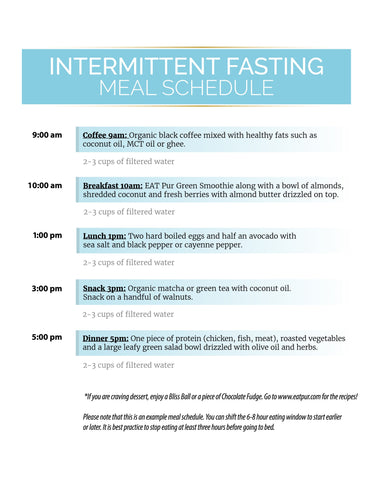
Intermittent Fasting Explained - An Interview with Dr. Emil and Amanda Tocci
We had the privilege of being interviewed by Erica at bringyourownkombucha.com on Intermittent Fasting and the health benefits of it. She asked us a series of interview questions to gain a base knowledge of what intermittent fasting is, why it's healthy and our personal tips on how to be successful with this eating strategy!
For those of us who are newbies, what exactly is intermittent fasting?
Amanda: Intermittent Fasting is an eating practice where someone eats during a 6-8 hour window in a day and fasts for at least 16 hours with no food consumption. It's a way of getting yourself into a fasting state daily. This is congruent with our genetics because it is a model of our ancestor's eating schedule.
WOW! I had no idea that it was actually based upon our eating schedule back in the day. What are the benefits to Intermittent Fasting?
Dr. Emil: There are a lot of benefits to fasting! The science behind fasting is called autophagy. Autophagy is how the body naturally cleanses and detoxifies itself, breaking down abnormal unwanted cells. It stabilizes your blood sugar, insulin levels, helps with cravings, reduces inflammation and puts your body in a fat burning state.
Amanda: It also affects hunger hormones, such as Ghrelin and Leptin sensitivity which can aid in weight loss. I personally love it because when I'm fasting I have mental clarity and feel much more alert and energized. I also think that it helps me not snack on foods late at night so I wake up feeling fresh with my body cleaned out. If someone is willing to try intermittent fasting, it can be a simple approach to detox the body and to burn body fat.
That SOUNDS AMAZING. But is it too good to be true? Why doesn't everyone do it?
Amanda: Cons- as far as cons to Intermittent Fasting, not everyone can handle attempting to fast for 16 plus hours. There are many factors that could make this challenging for someone such as lifestyle and eating habits. Most people have a difficult time changing what they eat and taking away foods that they like. With eating in a 6-8 hour window, you can still experience some of the benefits without having to change your diet. Now of course ultimately if someone isn't eating a healthy diet, they should look to make changes.
Dr. Emil: If someone has a challenge with their blood sugar, is dehydrated or if they are overweight, it may be hard to complete a fasting state without becoming lightheaded and dizzy. In this case there's another way to get into fasting which we utilize with patients and clients all the time. That approach is with a very specific diet but this is done while on a customized plan that is supervised by me or another qualified doctor.
This approach to eating is a more advanced strategy when it comes to dieting and can be looked at as a challenge to a lot of people but it is something that can be achieved into someone's lifestyle over time with proper guidance and support.
SO how do I (and all the BYOK readers) get started?
Dr. Emil: The easiest way to start is to just compress the food that you are currently eating into one consecutive 8 hour window. Again this may be challenging but start off with one day a week and build up the amount of days until you can reach 5 days per week. This is definitely a lifestyle although many are enticed to use it to lose weight as a quick fix.
(Utilize the below time table to help track when to start and stop eating while intermittent fasting)

I'm a big fan of Bulletproof coffee. Where does the Bulletproof coffee come into the mix with intermittent fasting?
Amanda: That's a great question! Bulletproof coffee or Keto coffee can be used as a substitute for breakfast and to curb hunger. You can drink coffee with a high quality fat in it during the 16 hour fasting window and it will not break your fast. This is great because it will keep you in a fasted state while feeling satiated, energetic and focused.
PERFECT! So even though I'm fasting, I can still have my bulletproof coffee! #Winning! How did you start intermittent fasting?
Dr. Emil: I started intermittent fasting in 2003 because I would get home from work late, eat dinner and go to bed. On certain nights when I skipped dinner and went to bed hungry, I noticed I would get up the next morning feeling much more energetic and fresh the next morning. I started to listen to my body and started using this method one day a week, then three, then 4 days a week. More recently I added a 5th day of fasting per week.
Amanda: I was introduced to intermittent fasting a few years ago through Emil. I thought he was crazy at first because he would start fasting from 2pm onward. Once I learned of the health benefits of it, I started to fast as well and have been doing it for 4 days a week for two years now. While 2pm worked well with his work schedule, it did not with mine and so my eating window is 10am-5pm. I created this sample intermittent fasting meal schedule for our clients so they can see it’s not as daunting and have an example of what my eating schedule looks like.

Can you exercise while you intermittent fast?
Dr. Emil: If you have been exercising, you can definitely continue your regimen but take caution because not everyone can handle exercising on an empty stomach without food. Although the combination of intermittent fasting and exercise is wonderful for your health, I would recommend for people just starting out to not exercise on your fasting days.
Does your diet remain the same when your fasting?
Amanda: While your diet can remain the same, it's much more advantageous to consume a diet full of clean protein, healthy fats and lots of vegetables. We always share health tips and tricks since each person is on their own health journey and so providing general guidelines can be helpful and apply to many people. One health tip we provide for people wanting to transition to eating more healthy foods is what is called “The Three Exchanges”.
- Exchange out grains (wheat, corn and rice) for ancient grains (such as quinoa, buckwheat, etc)
- Exchange refined sugars for natural sweeteners (such as honey, maple syrup, coconut sweeteners, monk fruit)
- Exchange poor quality fats for high quality fats (such as coconut oil, ghee, grass fed butter, avocado).
These are small changes that make a big impact and are helpful when easing people into a new way of eating.
Any other tips or tricks we should follow while intermittent fasting?
Dr. Emil & Amanda: Make sure to stay hydrated! Drink two glasses of water 20 minutes before eating. Utilize coffee with fat if you skip breakfast which will hold you over until you eat. Floss and brush your teeth after your last meal so it mentally gets you shut down from eating for the rest of the day. Also be sure that you are eating enough during the eating window and always listening to what your body is telling you.
